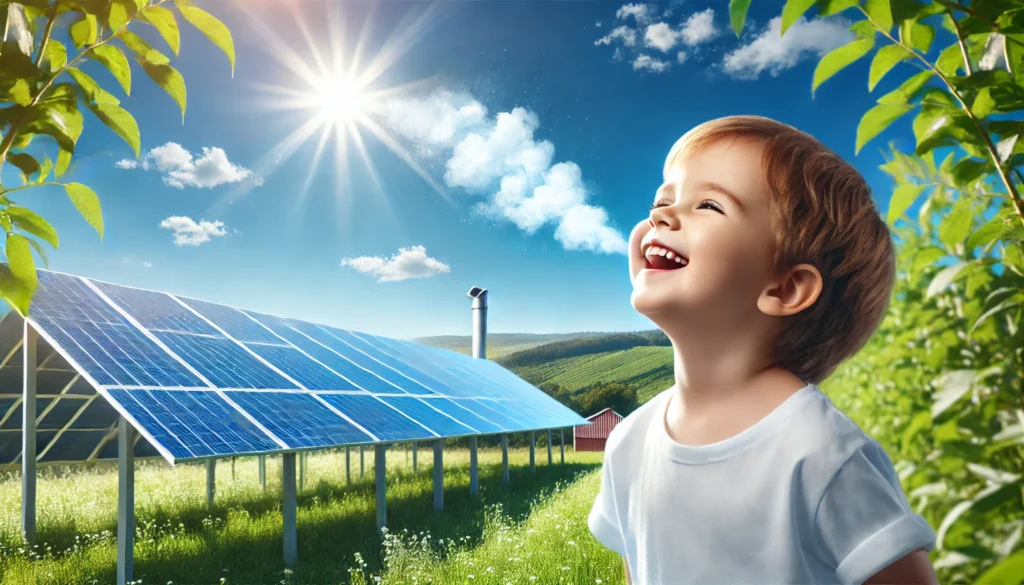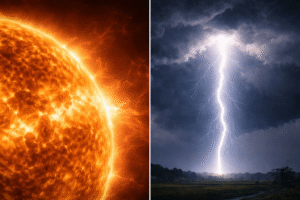Fun Fact: Did you know that air pollution kills more people annually than car accidents, but clean energy can help cut that down?
Picture this: a world where energy production doesn’t pollute the air we breathe, where hospitals are filled with fewer asthma patients, and communities aren’t plagued by respiratory issues from toxic fumes. That’s not just a dream—it’s the promise of clean energy. This article delves into how clean energy like wind, solar, and hydropower can drastically improve public health and enhance our quality of life.
What Is Clean Energy and Why Does It Matter?
Clean energy is any form of energy produced without releasing harmful pollutants into the air, water, or soil. Unlike traditional fossil fuels, which emit greenhouse gases (GHGs) like carbon dioxide (CO₂) and pollutants like sulfur dioxide (SO₂), clean energy sources are designed to minimize or eliminate these emissions. Think of solar panels capturing sunlight to power homes or wind turbines harnessing breezes to keep the lights on in schools.
This clean approach to energy isn’t just about keeping the environment intact; it’s also about protecting our health. Today, many people suffer from illnesses linked to air and water pollution—diseases that clean energy can help prevent.
Health Risks from Fossil Fuels: A Look at the Problem
Relying on coal, oil, and natural gas for power generation has effects that extend beyond just contributing to climate change. These fuels release particulates, heavy metals, and toxic chemicals that pose serious risks to our health. According to the World Health Organization (WHO), 7 million premature deaths worldwide each year are linked to air pollution.
Asthma and Respiratory Issues: Polluted air is a major trigger for asthma and can worsen respiratory illnesses. In cities with heavy coal or oil-based power production, rates of asthma are significantly higher.
Cardiovascular Diseases: Long-term exposure to air pollution has been linked to increased risks of heart attacks and strokes. Fossil fuel emissions contain fine particles that penetrate deep into the lungs, making their way into the bloodstream and damaging cardiovascular health.
Cancer and Other Chronic Illnesses: Coal-fired power plants, for instance, release mercury, which can lead to cancer and other chronic diseases.
By transitioning to clean energy, we can greatly reduce these health risks, protecting millions of people from preventable diseases.

How Clean Energy Directly Benefits Public Health
Switching to clean energy sources has immediate and long-term benefits for public health. Here are some of the biggest ways this transition can make a difference:
Reducing Air Pollution
Renewable energy sources, such as solar, wind, and hydropower, generate power without releasing harmful pollutants. According to a study by the American Lung Association, if the U.S. shifted entirely to clean energy, it could prevent up to 36,000 premature deaths each year. Imagine what a global shift could accomplish!
Example: In New Delhi, India, high levels of air pollution have become a public health emergency. When the Indian government invested in renewable energy to replace some coal-based plants, the area saw an improvement in air quality and fewer pollution-related illnesses.
Lowering Healthcare Costs
Fewer cases of respiratory diseases, cardiovascular illnesses, and cancers mean less burden on the healthcare system. Countries that have adopted renewable energy have reported reductions in healthcare spending related to pollution-linked diseases.
Case Study: Sweden is a great example of a nation actively prioritizing clean energy. With over 50% of its power from renewable sources, the country has not only reduced its carbon footprint but has also reported lower healthcare costs associated with air pollution-related diseases.
Mitigating Climate Change and Its Health Impacts
Climate change exacerbates health issues, with extreme heat waves, natural disasters, and food scarcity taking a toll on human health. Clean energy can help slow climate change, ultimately reducing these negative impacts.
Example: In California, extreme heat waves due to climate change have led to an increase in heat-related illnesses. The state’s goal of achieving 100% clean energy by 2045 is a crucial step in reducing health risks tied to rising global temperatures.
Supporting Healthier, More Resilient Communities
With cleaner air and fewer pollutants in water sources, communities benefit immensely. Fewer people miss school or work due to pollution-related illnesses, leading to a more productive, healthier population.
Anecdote: One woman from a small town near a coal power plant in Pennsylvania shared her relief when the town invested in a solar project. Her children, who had struggled with asthma, began having fewer episodes once air quality improved.
Real-World Evidence: Clean Energy in Action
Let’s look at a few countries that have successfully transitioned to clean energy and seen public health benefits:
Norway: Norway generates nearly all its electricity from hydropower, which has contributed to its citizens enjoying some of the cleanest air in the world.
Germany: With over 40% of its energy from renewables, Germany’s transition to clean energy has drastically reduced air pollution, leading to noticeable improvements in public health.
These success stories show that it’s not only possible to transition to clean energy, but that doing so comes with significant public health benefits.
What Can You Do?
Wondering how you can make a difference? Here are some steps:
Advocate for Clean Energy Policies: Support leaders and policies that prioritize clean energy investments.
Use Renewable Energy at Home: If possible, consider installing solar panels or choosing a green energy provider.
Spread Awareness: Educate friends, family, and community members about the health benefits of clean energy.
Conclusion: Clean Energy, Clean Health
The role of clean energy in public health improvement is clear—it’s a game-changer. By investing in renewables, we’re not just tackling climate change; we’re taking critical steps toward a healthier, more resilient population. Clean energy means cleaner air, fewer diseases, and better quality of life for all.
Let’s commit to a future where energy doesn’t cost us our health. The shift to clean energy is within reach, and the benefits are too big to ignore.
Author’s Note:
Embracing clean energy isn’t just an environmental choice; it’s a health decision that impacts us all. Let’s work together to build a cleaner, healthier future!
G.C., Ecosociosphere contributor.
References and Further Reading:
- World Health Organization – Air Pollution
- Combustion and engine technologies | IFPEN. https://www.ifpenergiesnouvelles.com/tags/combustion-and-engine-technologies
- How Does Air Quality Affect Your Health, and How Can Clean Air Filters Help? | Founterior. https://founterior.com/how-does-air-quality-affect-your-health-and-how-can-clean-air-filters-help/




